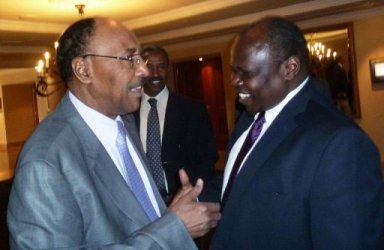Sudan, South Sudan security talks resume in Ethiopian capital
By Tesfa-Alem Tekle
July 5, 2012 (ADDIS ABABA) – Sudan and South Sudan negotiators on Thursday resumed talks on security arrangements as the AU-UN set deadline for the two sides to resolve their outstanding post-partition issues approaches.

The two sides fail to reach agreement on key security and border issues during their last round of talks last week but managed to agree on the activation of the Joint Border Verification and Monitoring Mechanism (JBVMM).
In early May United Nations Security Council and the African Union gave Sudan and South Sudan a three-month deadline to conclude negotiations over their outstanding issues, following a border war in April of the Heglig oil region, which is claimed by both sides.
Among the items that remain to be resolved after South Sudan’s independence on 9 July 2012 are how much South Sudan should pay to export its oil through Sudan’s pipelines, citizenship, border demarcation, and the status of the disputed Abyei region.
The two nations have less than a month to resolve their differences before the UN-AU deadline expires on 2 August. Both sides face the prospect of of sanctions if a deal is not agreed.
South Sudan’s chief negotiator, Pagan Amum, said his team were had “optimistic plans” to bring to the table.
The African Union-mediated talks on security matters will be followed by further negotiations between committees on other pending issues later this week and on high level political meetings next week.
Mean while, AU spokesperson, Noureddine Mezni, on Thursday confirmed to Sudan Tribune that Sudanese president, Omar al-Bashir and his South Sudanese counterpart, Salva Kiir, will hold meeting in Addis Ababa in the margins of the African Union Summit which will kick off next week in the Ethiopian capital.
Mezni, declined to give further details over the presidential meeting which is believed to have been proposed by Ethiopian Prime Minister, Meles Zenawi.
The two leaders’ presence in Addis Ababa is believed to create good atmosphere among both negotiators. Kiir and Bashir’s last meeting was in Khartoum in October 2011.
Kiir’s visit was to be reciprocated by Bashir on April 3 2012 but Khartoum cancelled the visit as border clashes around Heglig intensified resulting in South Sudan’s army occupying the area from April 10-20.
On his visit to Juba the two Presidents had been due to sign a citizenship agreement on the status of Southern Sudanese living in Sudan and Sudanese living in South Sudan.
However, the war of Heglig put the talks back and triggered the United Nations and African Union to step in with a new deadline for post-independence issues to be resolved.
South Sudan accuses the Sudan Armed Forces of dropping of 80 bombs on its territory since it seceded last year and further accuses Khartoum of supporting southern rebels, who are fighting the government in Upper Nile, Jonglei and Unity State’s
Khartoum denies this and has demanded that Juba admit that it continues to back to SPLA-N in the border states of Blue Nile and South Kordofan. During Sudan’s two decade civil war the SPLA-N fought with the southern Sudan-based SPLA, which is now the governing party and army of the new nation.
Tutu in Addis
A three member delegation of senior international leaders, led by Archbishop Desmond Tutu, have arrived in Addis Ababa as part of a six-day visit to Ethiopia, South Sudan and Sudan, aimed at encouraging the AU led peace efforts.
The delegation which also comprises Martti Ahtisaari, former President of Finland and Mary Robinson, former President of Ireland and former UN High Commissioner for Human Rights is expected to encourage and push Sudan and South Sudan leaders reach into a tangible peace deal.
“The Elders’ aim is to encourage leaders of South Sudan and Sudan to take the path of peace for the benefit of their people and to draw attention to the human suffering caused by conflicts, particularly the growing refugee crisis in the border regions,” the group announced on 5 July.
The delegation, the statement says, will hold high-level political meetings in the three countries’ capitals, and meet people directly affected by the deterioration of relations between the two Sudans.
“The Elders wish to support local peace-building efforts, reinforce the unprecedented united international position on South Sudan and Sudan, and lend their weight to the implementation of the AU roadmap of 24 April and UN Security Council Resolution 2046 (2012),” The Elders said in a statement.
In Juba, the South Sudan capital, Archbishop Tutu and fellow members of The Elders will participate in an ecumenical church service organised by the Sudan Council of Churches (SCC) on Sunday.
Founded in October 2007 by former South African President, Nelson Mandela, The Elders have for long regarded peace in Sudan and South Sudan as a priority since the group’s formation.
Over the past years, the team has visited the two Sudans and met political leaders, tribal heads, women groups and civil society members, prominently highlighting the human impact of conflict and fundamental human rights.
Last year, members of The Elders visited Sudan as part of the Carter Center’s observation mission for South Sudan’s self-determination plebiscite, necessitated by the 2005 peace deal between north and south Sudan.
Meanwhile, The Elders have expressed concerns about the deteriorating security and economic situation in the two Sudans, with particular focus on the human impact of the conflicts in Blue Nile and South Kordofan states, pledging to step up their engagement in the region in pursuit for remedies to these challenges.
The United Nations Refugee agency (UNHCR) on Wednesday warned of the dire conditions of Sudanese refugees fleeing the fighting in Sudan’s Blue Nile and South Kordofan, saying humanitarian efforts to save them was close to “breaking point”.
More than 200,000 people, according to the agency, have been displaced into neighboring South Sudan and Ethiopia since fighting broke out in these two states, with the numbers anticipated to increase.
(ST)
